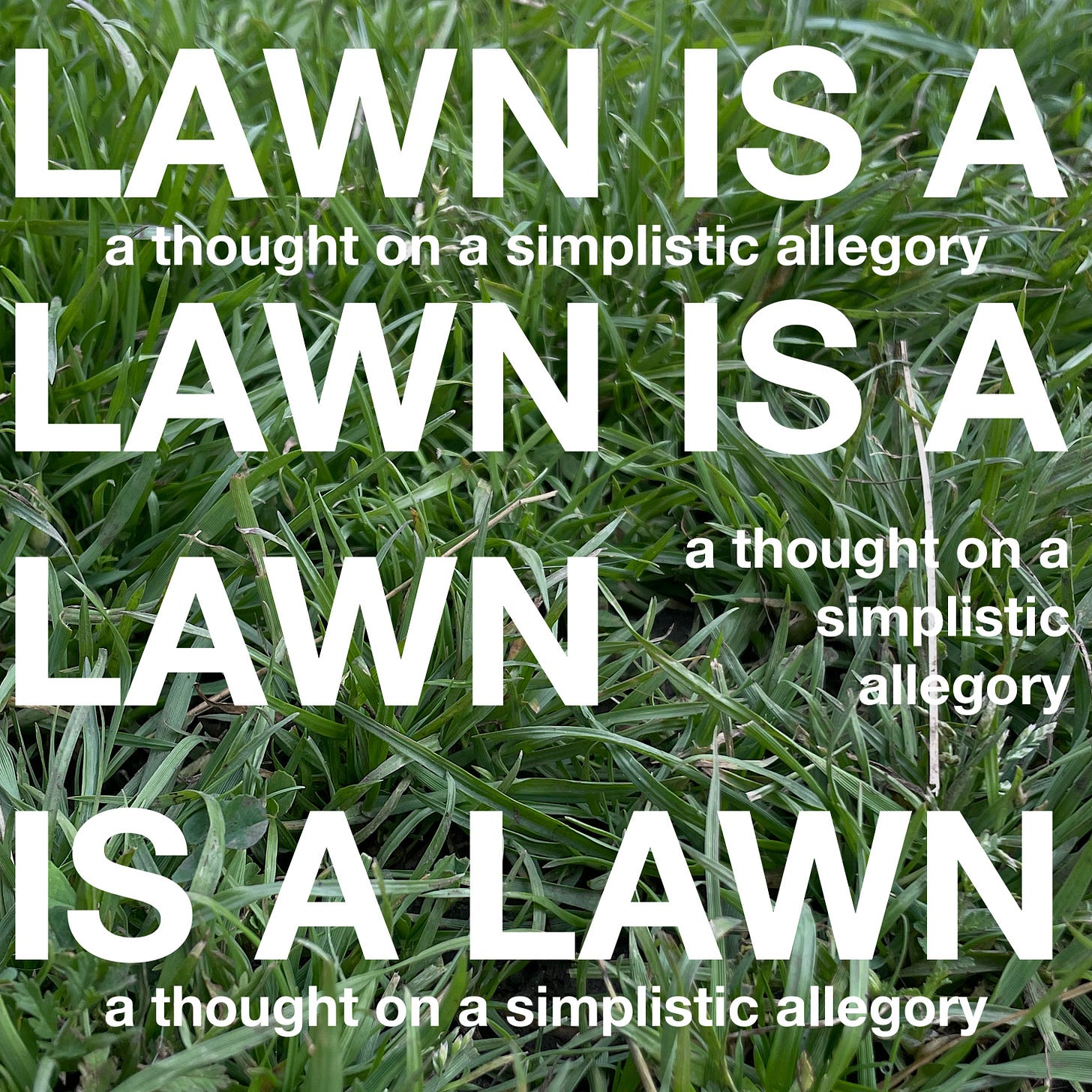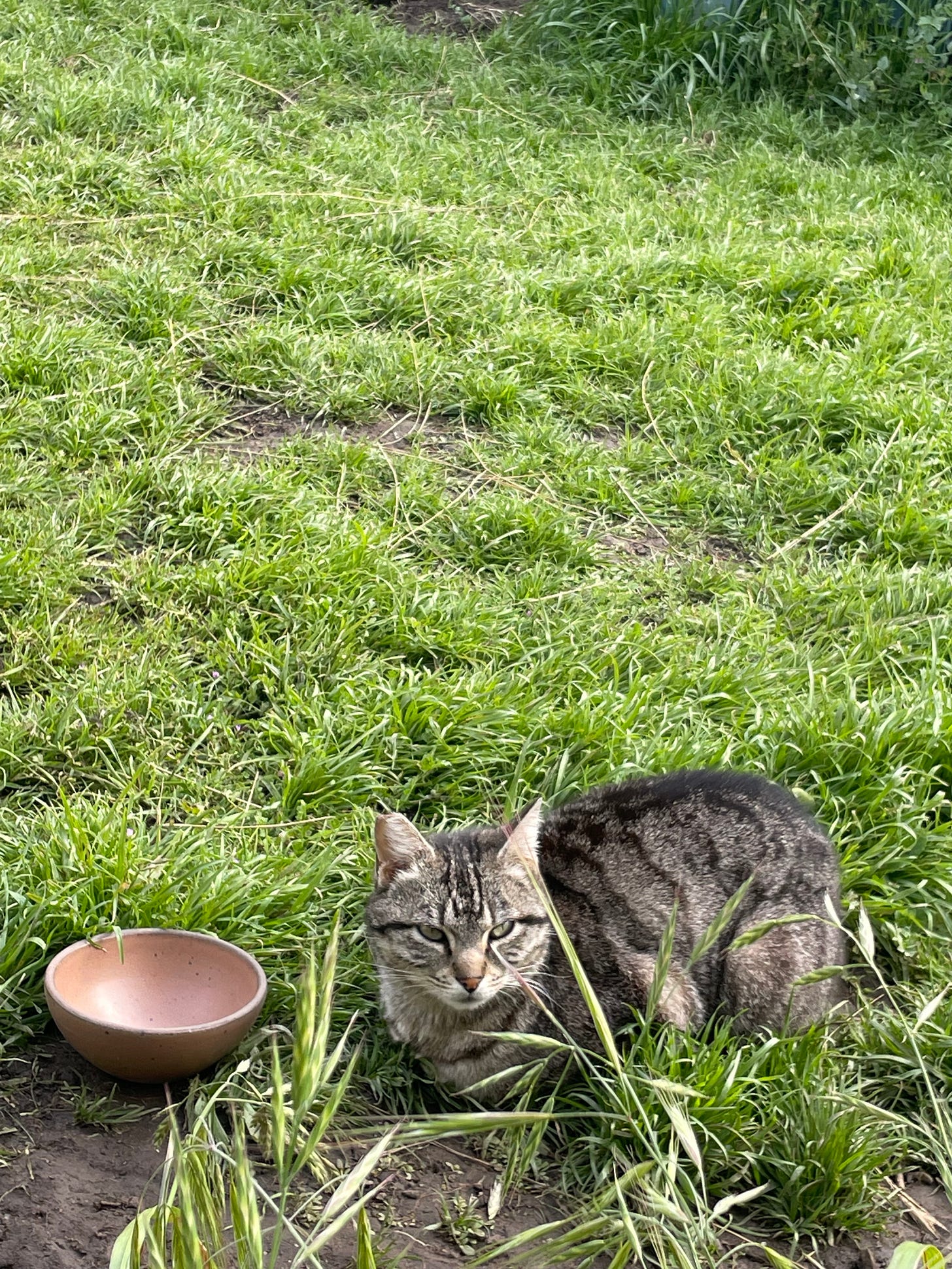I thought I had a great idea for something to write about: grass. Not the general family, Poaceae, or milky oat grass, or cattails. Nothing “out there” or in the wild. Just lawn grass. I thought this might be a good thing to write about, just to ponder cultivation of plants, domesticity, and turn that into some little story or metaphor on how we could be so egotistical, as Western Europeans, as to think it’s a good idea to plant grasses in temperate deserts. That we, this culture and its simplistic ideas of growth and order—consistency above what is more naturalistic and a simpler fit for the confines of temperature, seasons, geography, and niches—are ignorant to what this earth needs just to maintain its own equilibrium.
I wanted to write that, but then I started looking into grasses. All I could find, beside that the lawn’s origin come from sheep herding and the British commons, was that grass, as I already figured, was from Europe and is often cultivated as Kentucky bluegrass, which is an intensively water dependent plant, and not something that should be growing where we have it in North America today. Besides the water use of the plant, my idea of the grass had sort of slipped away from me. I was more interested in the plant itself than I was in my metaphor. There were too many things that were necessary to answer before I could write, and what answers I found begged too many questions.
Then I read Neil Genzlinger’s New York Times review for the 2006 book American Green. In it he said that much of the book was trying to do lazy sociological work, mockingly writing, “Almost everyone in the Eisenhower years had a crew cut, and almost everyone with a crew cut was obsessed about having a perfect, crew-cut lawn. Americans are so dumb and docile that we seem to do whatever Scotts lawn-care advertisements tell us.”
This was basically what I was trying to do—make some lofty metaphors and similes about our world based on the lawn in front of me as I write this outside. It is a lazy form of writing, soap-boxy and easy to jot down. To stand on the soap box is simple, especially so in writing because so few people are there at your side to shut you up, so it feels as though what you’ve said has “gotten through” even if what you did say is completely stupid, like saying that the conformity of the fifties made parallel the desire to kill crab-grass as much as Communists. You can get away with something that is reductive when you write it down and no one is there to push back on what you say. No one is there to argue with you that, while you’re making an interesting argument, there is too much nuance and subtlety in that era for us to say that killing crabgrass was tied directly to a delusional American patriotism, or the Red Scare. There might be something there, but we can’t just say things to say them.
The premise that I had, to make lawn cultivation into a metaphor on colonialism and our ecological ignorance, is a decent yet unoriginal idea, and could so easily fall into the trap of a blanket statement. And in that blanket I would forget that out there, in the world beyond the screen where you read this, there are living people conflicted by the insatiable love of lawns. They have genuine enjoyment in the act of lawn care, or simply laying in a grassy park during a hot day. In other words, if I were to go with that main premise, I might lose the more human truth that the lawn itself is not perfectly bad, or perfectly good. And I wouldn’t answer or address the truth that many who have lawns also do not understand their compulsive joy to tend it.
This is not to say I love lawns. Personally, I would be happy and fine to see them all disappear and be made into something else entirely (maybe city parks could become native plant meadows). But that wasn’t really the point of that piece, but our ignorance. And if I am ignorant to the joys a lawn brings, am I not just being hypocritical?
If I end up writing the unoriginal lawn piece in the future, it would likely be read as an allegory, not as some sort of tirade on lawns themselves. But importantly that kind of rant would be reductive, and that’s something that we have enough of anyway. And what’s more, milky oats are a way more interesting grass to write about.






When I was about 5, my newly immigrant parents and I lived in a ground floor apartment whose dining room window looked out on our “lawn” - about 100 sq. feet of grass. As English-speaking would-be Americans (though with marked accents) we would often take a Sunday afternoon drive to fancier parts of town with single-family homes complete with
verandaed front porches looking at well trimmed lawns, looking to some sort
if possible future, I guess. I
remember coming home and
thinking, “we live in an apartment building, but we have a LAWN!! It was 1952.